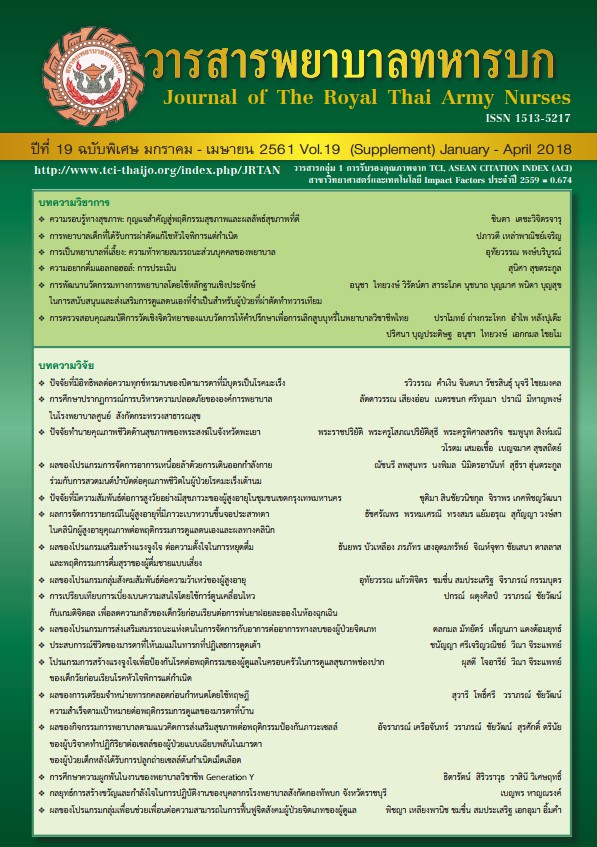Developing Evidence-Based Nursing Innovations for Supporting and Promoting Necessary Self-Care for Colostomy Patients
Keywords:
Nursing innovation development, Evidence-based practice, Colostomy, Self-careAbstract
Colostomy is a surgical procedure that brings one part of the end of the large intestine out through an opening (stoma) of the abdominal wall. Stool was moving through the intestine drainage through the stoma and dropped into a bag attached to the abdomen wall. This surgical procedure is for the patient with bowel problems, especially patients with colorectal cancer. However, this surgery may affect to the physical and psychological health of patient, his/her appearance, daily life, and quality of life. Therefore, the patients required to perform proper self-care. The purpose of this article was to propose nursing innovations in promoting self-care for colostomy patients based on Orem’s self-care theory and empirical evidence applying from Flemming & Fenton’s concept, consisting of five-step practices namely 1) questioning from problem situations, 2) searching for empirical evidence, 3) evaluating the quality of empirical evidence, 4) deciding and implementing, and 5) continuous monitoring the performance. The developed nursing innovations consisted of 1) Colostomy Patient Care Plan, 2) Self-care Files, 3) Self-care Manuals for the Patients, 4) Instructional Models invention, and 5) Colostomy Bag Invention. When the innovative nursing model had been implemented, it was found that the patients and caregivers had a high level of knowledge, skills, and satisfaction with the developed innovative nursing model.
Downloads
References
2. Melotti LF, Bueno YM, Silveira GV, Silva MEN, Fedosse E. Characterization of patients with ostomy treated at a public municipal and regional reference center. J Coloproctol. 2013;33(2):70-4.
3. Chaithat B. Caring for colorectal cancer patients undergoing ostomies: roles of enterostomal therapy nurses. Thai Red Cross Nursing Journal
2016;9(1):19-33. (in Thai)
4. Prechaterasat A. Enterostomal therapy nurse’s role: case study in nursing care for rectal cancer patients. Thai Red Cross Nursing Journal
2017;10(1):22-34. (in Thai)
5. Srimahasarakham College of Nursing. Reportof group discussion for developing evidence-based nursing innovations for supporting and promoting necessary selfcare for colostomy patients. Mahasarakham Province; 2018.
6. Dabirian A, Yaghmaei F, Rassouli M, Tafreshi MZ. Quality of life in ostomy patients: a qualitative study. Patient preference and adherence
2011;5:1-5.
7. Roshini AP, Sunny A, Anthony P, Rozario AP. Quality of life assessment in stoma patients in a tertiary care hospital in South India: a cross- sectional study. Int Surg J. 2017;4(6): 2037-41.
8. Vonk-Klaassen SM, de Vocht HM, den Ouden MEM, Eddes EH, Schuurmans MJ. Ostomy-related problems and their impact on quality of life
of colorectal cancer ostomates: a systematic review. Qual Life Res. 2016;25:125-33.
9. de Campos K, Benites Bot LH, Petroianuc A, Rebelo PA, de Souzaa AAC, Panhocaa I. The impact of colostomy on the patient’s life. J coloproctol(rio j). 2017;37(3):205-10.
10. Ran L, Jiang X, Qian E, Kong H, Wang X, Liu Q. Quality of life, self-care knowledge access, and self-care needs in patients with colon stomas one month post-surgery in a Chinese Tumor Hospital. International journal of nursing sciences 2016;3:252-8.
11. Cheng F, Meng AF, Yang LF, Zhang YN. The correlation between ostomy knowledge and self-care ability with psychosocial adjustment in Chinese patients with a permanent colostomy: a descriptive study. Ostomy Wound Manage 2013;59(7):35-8.
12. Wannawong S, Isaramalai S, Kahawong W, Naknual S. Efficiency of program to support and enhance care agency to prevent complications in ostomates. Princess of Naradhiwas University Journal 2014;6(3):34-8. (in Thai)
13. Culha I, Kosgeroglu N, Bolluk O. Effectiveness of self-care education on patients with stomas. Journal of Nursing and Health Science 2016;5(2):70-6.
14. Mohamed SS, Salem GMM, Mohamed HA. Effect of self-care management program on self-efficacy among patients with colostomy. American Journal of Nursing Research 2017; 5(5):191-9.
15. Orem DE. Nursing: concepts of Practice (6th ed.). St. Louis: Mosby; 2001.
16. Purimayata P, Vibulchai N, Wongsahi T, Waramit W. A research and development of a set of dialysis bag-mattress innovation for pressure
sore prevention in patients with fracture. Nursing Journal of the Ministry of Public Health 2016;26(3):104-17. (in Thai)
17. Flemming K, Fenton M. Making sense of research evidence to inform decision making. In Thompson C. Dowding D. editors. Clinical decision making and judgement in nursing. Toronto: Harcourt Publishers Limited 2000; 109-29.
18. Krirkgulthorn T, Ratchawat P, Naraphong W. Utilization of evidence-based pedagogy towards graduate identity at Boromarajonani College of Nursing Saraburi. EAU Heritage Journal. 2013;7(2):108-19. (in Thai)
19. Ubolphong K, Chaokhamin T, Pongampai O, Pheunpha C. The development of nursing service model for colon cancer patients with colostomy procedure in Saraburi Hospital. Journal of Nursing Division 2012;39(2):51-64.
20. Taiwong A, Anekwit A, Saraphok W, Urakeaw N, Jitsawa N, Phawpolsong N, et al. Innovative set to promote arms and shoulders exercise
after breast surgery: from evidence based practice to innovation. Mahasarakham Hospital Journal 2017;14(3):114-24.
Downloads
Published
How to Cite
Issue
Section
License
บทความหรือข้อคิดเห็นใดใดที่ปรากฏในวารสารพยาบาลทหารบกเป็นวรรณกรรมของผู้เขียน ซึ่งบรรณาธิการหรือสมาคมพยาบาลทหารบก ไม่จำเป็นต้องเห็นด้วย
บทความที่ได้รับการตีพิมพ์เป็นลิขสิทธิ์ของวารสารพยาบาลทหารบก
The ideas and opinions expressed in the Journal of The Royal Thai Army Nurses are those of the authors and not necessarily those
of the editor or Royal Thai Army Nurses Association.






